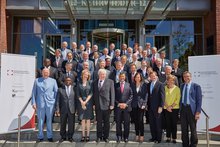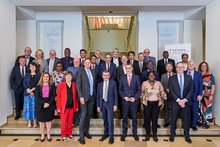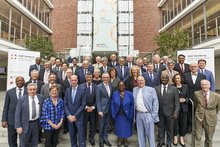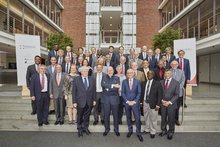Global University Leaders Council Hamburg (GUC)

Global University Leaders Council Hamburg (GUC)

Co-organised by the German Rectors’ Conference, the Körber Foundation, and Universität Hamburg, the Global University Leaders Council Hamburg (GUC) regularly brought together university leaders from all world regions to develop and shape universal ideas and values of higher education. The GUC Hamburg aimed to identify and jointly pursue approaches for the development of universities worldwide. Until 2017, the Council was held under the name Hamburg Transnational University Leaders Council.
“Navigating Competition and Collaboration – GUC 2023 adopts declaration on the way forward for Universities”
16.06.2023 At its fifth meeting, the Global University Leaders Council (GUC) brought together 30 university leaders from 21 countries and six continents in Hamburg from 14 to 16 June 2023 to discuss the global challenges facing the higher education system. This year's GUC focused on how competition and cooperation in crucial processes can be shaped for the benefit of society, science and future generations. After intensive and fruitful discussions, the participants adopted the Hamburg Declaration, in which they formulated their concerns and expectations regarding the role of competition and cooperation in higher education. More
The basis for discussion and the scientific foundation of this year's Council was the study "Navigating competition and collaboration - The way forward for universities" commissioned by the Körber-Stiftung. Under the expert leadership of higher education researcher Peter Maassen from the University of Oslo, the study discusses how higher education institutions worldwide can benefit from strategic partnerships and value-based action and contribute to sustainable solutions for competition and cooperation.
Environmental protection and sustainability: future topics for all university curricula

4 Juni 2021 At the Global University Leaders Council Hamburg 2021, university leaders from all over the world adopted recommendations on concrete university engagement for global sustainability and against climate change. All students should be familiarised with the challenges of climate change and sustainability issues during their studies. This is one of the goals agreed upon by 45 university leaders from 27 countries at the Global University Leaders Council Hamburg (GUC).
The discussion and scientific basis for the Council was the study "Universities facing Climate Change and Sustainability" commissioned by the Körber Foundation. The study, conducted under the expert leadership of university researcher Tristan McCowan from University College London, shows what universities can already contribute to coping with climate change and what challenges they are facing in the process.
Growing need for the social engagement of universities
Relationship between universities and society: International university leaders adopt recommendations
7 June 2019 Rising expectations and pressure to legitimise: at the third Global University Leaders Council Hamburg, 45 university leaders from 23 countries gathered from 5 to 7 June to discuss the rela-tionship between universities and society. It is marked by increasing, sometimes conflicting expectations placed on universities to contribute to social development on top of their core commitment to research and teaching. More
Growing expectations placed on universities
International study finds that universities are expected to contribute more to society in addition to teaching and research
4 April 2019 The list of requirements placed on universities is long. They are expected to make higher education available to a growing number of students, attract new social groups to study programmes and meet diversified labour market requirements. At the same time, internationally competitive research is expected to solve issues concerning the world's future and applied research is supposed to boost the economy at the local level.
These growing, sometimes conflicting expectations regarding the societal relevance of universities can be seen all over the world, however, they differ with respect to their form from country to country. Universities in Germany are also being confronted with these growing demands.
These were the key findings of the study "The Place of Universities in Society" by the University of Oslo, commissioned by the Körber Foundation. The study was undertaken in preparation for the third Global University Leaders Council Hamburg to be held in June 2019, commissioned by the Körber Foundation. More
Quality of higher education under threat
9 June 2017 Worldwide, the demand for an academic education continues to grow. The result is the rapid expansion of higher education institutions; the private sector, in particular, is booming. In countries through- out the world, it is thus becoming increasingly difficult to safeguard the qualiity of higher education. This is a finding by the second Hamburg Transnational University Leaders Council. Forty-seven university leaders from Africa, Asia, Australia, Europe and North and South America came together to attend this Council in Hamburg from 7 to 9 June. They discussed and debated the consequences of the trend towards academisation and the future of higher education at the invitation of the German Rectors’ Conference, the Körber Foundation and Universität Hamburg. More
Worldwide boom in post-secondary education
Study: Many higher education systems are growing without long-term strategies
22 February 2017 As the knowledge-based society grows, so too does the global requirement for academics and highly trained professional staff. The rising demand for higher education and growing worldwide economic competition are putting governments under enormous pressure and resulting in rapid rates of change in education systems throughout the world. This includes the expansion of existing institutions and an increase, in some cases a surge, in the establishment of new institutions. This boom has given rise to national post secondary education systems that are heterogeneous and diverse in themselves. What is missing are long-term strategies and coherent development. That is the result of a study commissioned by the Körber Foundation, “Responding to Massification: Differentiation in Postsecondary Education Worldwide” by the Boston College. More
The First Hamburg Transnational University Leaders Council
Shared Values as a Guide for the Global Development of Universities

12 June 2015 There must be a shared basic understanding of core issues concerning universities that transcends countries and continents. Only on this basis can universities continue to play their key role in progressing research, society and the economy.
This was the conclusion of the 50 university leaders from Europe, North and South America, Asia and Africa who met from 10 to 12 June at the KörberForum for the first Hamburg Transnational University Leaders Council at the invitation of the German Rectors' Conference, the Körber Foundation and Universität Hamburg. More



